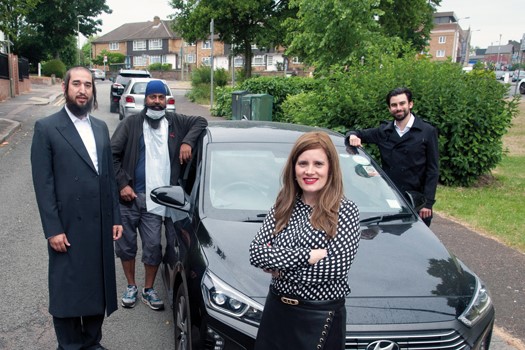
Profile – Dr Sharon Raymond
Location – London
Roles – Co-founder of Covid Crisis Rescue, non-profit foundation; portfolio GP working in unscheduled primary care, including 111; named GP for safeguarding children for two London CCGs; safeguarding and GP trainer; NHS GP appraiser; medical member of Tribunal.
If you would like to contribute to CCR, visit tinyurl.com/ccrjustgiving
Monday
I set up Covid Crisis Rescue (CCR) with Alex Adams – a non-medical social entrepreneur – at the end of March this year for the purposes of distributing PPE to NHS front-line and allied staff. Over 25,000 items of PPE have been donated so far. It has grown and we are coming up with new ideas all the time.
One idea is the Covid Cab Service.
I realised through my out-of-hours work that many patients with suspected or confirmed Covid- 19 who require face-to-face assessment have no private transport. We sometimes ended up requesting an ambulance or a GP home visit, even if it was not clinically indicated. Otherwise, the patient had to jump in an Uber, or get a friend, relative or neighbour to drive them.
We had initial discussions with well-known cab firms to address the issue, but these didn’t progress. Then I saw an article in the paper about a local firm Simcha Cars, whose manager was volunteering in local hospitals.
I contacted him. We discussed logistics.
After further detailed discussions with Professor Fiona Sim, a public health consultant, Alex and I contacted Simcha and arranged funding to have the cabs fitted with screens to separate drivers and passengers. There are now more than 100 cabs with screens and PPE, serving patients who need transport to hospital or a GP in London. If patients are unable to afford the fare, CCR covers the cost. To this day, I’m still receiving positive messages from GP colleagues whose patients have used the cab service.
This evening, I work a GP out-of-hours shift, where a consultation gives me my next idea: a pulse oximeter loan service.
Tuesday
I start to look at the challenge of Covid-19 testing in workplaces. Silent spreaders, individuals who are asymptomatic but have active infection, need to be identified to reduce the chances of a workplace-based outbreak of virus.
I’m put in contact with the Lord Mayor of the City of London, who backs the plan for work-based testing, and days later we are testing asymptomatic staff at Legal & General in the City of London. The Lord Mayor and the CEO of Legal & General both attend for testing. The initiative makes the ITV national news.
This work will lead to a collaboration on a Covid-19 testing programme with a homeless charity to reduce the chances of an outbreak at homeless shelters.
The pandemic has been the worst of times, and yet it’s brought out the best in many. Three new services – the Covid Cab Service, Urgent Oximeter Response, and Silent Spreaders testing – were devised, launched and fully operational in the space of about four weeks, achieved with the support of too many people to list individually. If I’ve learned anything it’s the following: dream it, do it. Follow through on the ideas you have.
Wednesday
I turn my attention to the issue of pulse oximeters. We have already been donating these through CCR to a range of NHS and allied services, including GP out-of-hours services, hospices, homeless shelters, and over 30 care homes in London. But my out-of-hours consultation on Monday made me realise we need an oxygen saturation probe loan service to supply any patient with suspected or confirmed Covid-19 in London in and out of hours.
Today I’m doing safeguarding work. Once I finish, I look at some messages CCR has received. One is from a Vikki Van Someren, who heads the Bike Shed Community. She’s offering to help with the delivery of PPE. She has a team of volunteer bikers all over the country.
I call her and explain my plan for a London-wide pulse oximeter service 24/7, and she assures me she’s in.
Friday
A few short days after first having the idea, Urgent Oximeter Response is now a reality thanks to amazing colleagues. Any patient deemed to need an oxygen saturation probe for ongoing monitoring receives one delivered by a volunteer within 90 minutes, anywhere in London. Once my shift is over, I step out into my unkempt back garden and hear the sound of ambulance sirens – a reminder, as if one was needed, of the havoc Covid-19 is wreaking.
Pulse October survey
Take our July 2025 survey to potentially win £1.000 worth of tokens












